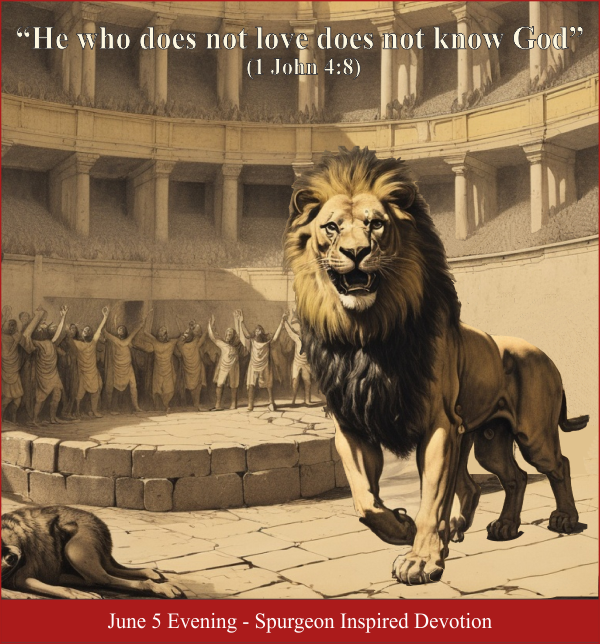
| June 5 Evening Devotion |
|
|
“He who does not love does not know God” (1 John 4:8) A distinguishing mark of a saint is his confidence in the love of Christ, and secondly, his ability to love Christ and the saints with God’s unselfish love. Not all new saints have deep feelings of love, but all saints know by saving faith, God loves them. The Apostle John goes on: “this is the love of God, that we keep His commandments” (1 John 5:3). Oops. John says the evidence of the kind of love that comes with saving faith manifests itself in keeping God’s commandments. This is confirmed by what he said earlier, “He who says, ‘I know Him,’ and does not keep His commandments, is a liar, and the truth is not in him. But whoever keeps His word, truly the love of God is perfected in him. By this we know that we are in Him. He who says he abides in Him ought himself also to walk just as He walked” (1 John 2:4-6). Yes, love can be a natural response to Christ in return for His love and sacrifice, but please, please, listen carefully. There’s a profound truth in “We love Him because He first loved us” (1 John 4:19) which many people miss. John isn’t just saying, “we love Him, because we’re grateful”. John is saying, “we are able to love Him with His kind of love, because God has made a New Man inside us which loves according to His Divine Nature (2 Peter 1:4). For the early Church, the love of God was tied to the promise of eternal life. “Now hope does not disappoint, because the love of God has been poured out in our hearts by the Holy Spirit who was given to us” (Romans 5:1). The love they felt wasn’t just a quiet feeling. They didn’t just talk about Christ on Sunday, they “gossiped” the Gospel. Love for Christ was their motivating passion, a fire that burned from the inner man to the outer man, and manifested in bold, fearless zeal for His glory. Because of their dependence upon His love, and faith in eternal life, they overcame their fear of persecution and death, being eaten by wild animals and burnt at the stake in the Roman arenas. “The love of Christ compels us …He died for all, that those who live should live no longer for themselves, but for Him who died for them and rose again” (2 Corinthians 5:14-15).
|
| 📧Get daily devotionals directly your email box.📧 |
 |